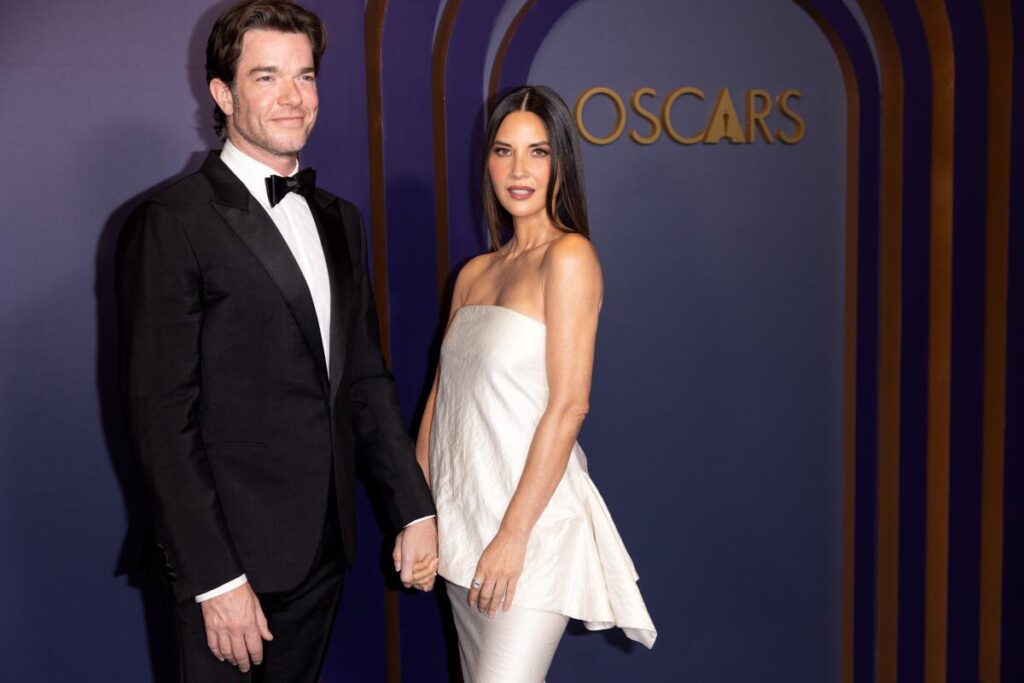The motion picture academy’s Governors Awards, delayed for weeks because of the actors’ and writers’ strikes, took place Tuesday on the eve of Oscar nominations voting, with Mel Brooks, Angela Bassett and film editor Carol Littleton receiving honorary Academy Awards and the Sundance Institute’s Michelle Satter delivering an emotional speech accepting the Jean Hersholt Humanitarian Award.
Filmmakers Ryan Coogler and Chloé Zhao, two of the dozens of directors that Satter has nurtured as founding director of the Sundance Institute’s artist programs, presented the award to the woman they both considered a mother figure. Coogler broke down briefly a couple of times during his remarks, passionate about the impact Satter has had on his life and distraught at the loss she suffered when her son, Michael Latt, a marketing consultant and social justice advocate with strong ties to Hollywood, was killed in November. Latt worked on Coogler’s 2013 directorial debut, “Fruitvale Station.”
“You changed our lives,” Coogler told Satter, “and I do believe Michael was your greatest gift to the world. And every time I talk with you, every time I’m in your presence, it feels like he’s still here with us.”
Satter said she shared the honor with Michael, and, noting his devoted support of people and organizations that elevated artists of color, urged those in attendance to “come together as an inclusive community.”
It was one of several emotionally charged moments during the Governors Awards ceremony, an evening that presents the honorary Oscars that were once part of the televised Academy Awards and also serves as something of a campaign stop for contenders trying to capture academy voters’ attention.
On the latter front, the casts and crews of such high-profile films as “Oppenheimer,” “Barbie” and “Killers of the Flower Moon” were out in force, and “The Holdovers” star Paul Giamatti was busy greeting well-wishers between bites of a meal that wasn’t nearly as good as the burger he enjoyed at the Westwood In-N-Out on Sunday after winning the Golden Globe.
The evening also served as a reaffirmation on the value of hiring a stand-up comedian host — in this case, John Mulaney — who’s actually sharp and funny. Mulaney, introducing himself to “those who don’t recognize me from the Tuesday night AA meeting in the Palisades,” delivered a terrific 20-minute opening monologue, touching on actors’ desperation and Hollywood self-importance and doling out praise to the evening’s honorees.
“Here’s what a great actor Angela Bassett is: She got an Oscar nomination for a Marvel movie. That’s like getting a Pulitzer Prize for a Reddit comment,” Mulaney said.
Governors Awards emcee John Mulaney and Olivia Munn on the red carpet.
(Jay L. Clendenin/Los Angeles Times)
Bassett might argue that point, proud as she is of Queen Ramonda in “Black Panther: Wakanda Forever.” And she probably would have won the Oscar for that role last year, had “Everything Everywhere All at Once” not steamrolled through the season.
Regina King presented the Oscar to Bassett, calling the star of such films as “What’s Love Got to Do with It” and “Boyz n the Hood” a “national treasure,” saying that she’s “artistic excellence embodied in the human form.” Bassett’s speech initially followed the usual thank-you beats. But she was just getting warmed up, noting that she “thought long and hard” about what she’d say.
“Do I go the route of saying a few words of gratitude for what this moment means to me?” Bassett mused. “Or do I give voice to what I hope this moment should mean for generations of Black actresses to come?”
Bassett took the latter route, listing all the Black women who have won competitive Oscars, calling out their names for “being beacons of possibility.”
“What I hope this moment means is that we are taking the necessary steps toward a future in which it is the rule and not the exception to see and embrace one another’s stories and perspectives,” Bassett said. “When we stand together, we win together.”
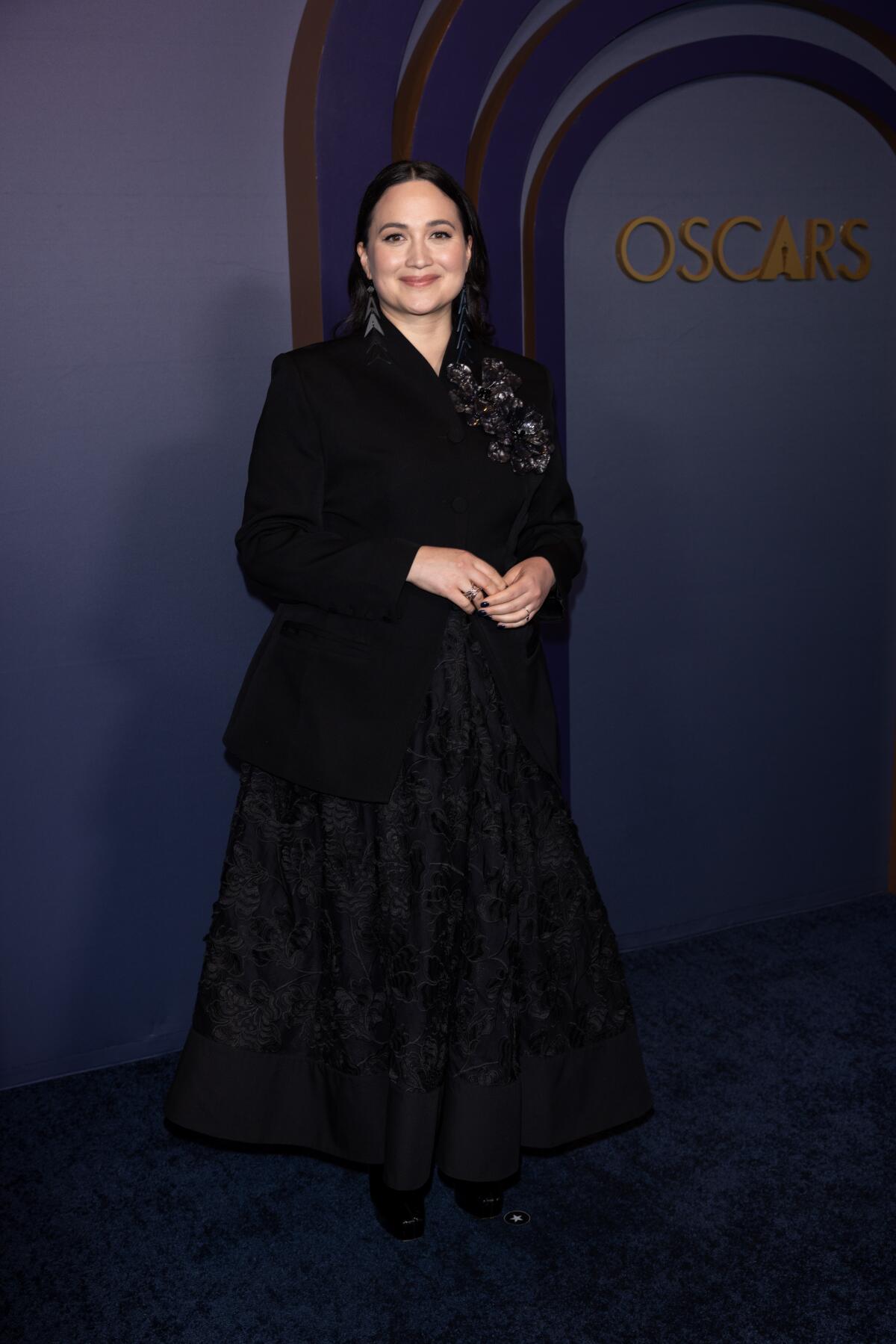
“Killers of the Flower Moon” actor Lily Gladstone was among the Oscar contenders in attendance at the Governors Awards.
(Jay L. Clendenin/Los Angeles Times)
Brooks, 97, kept his remarks brief. Matthew Broderick and Nathan Lane, stars of the Broadway and film versions of Brooks’ hit “The Producers,” introduced him, with Broderick noting that Brooks’ detractors had often accused him of “vulgarity.” “To which he famously replied, ‘That’s bulls—,’” Broderick noted. The duo then broke into a song medley salute, serenading the comedian with numbers referencing his films like “High Anxiety” and “Young Frankenstein.”
Brooks ambled to the stage, kissed both presenters on the cheek (not that cheek) and told the audience in the Ray Dolby Ballroom that he was going to hold onto this award, unlike the original screenplay Oscar he won in 1968 for the first film version of “The Producers.”
“I miss it so much,” Brooks joked. “I never should have sold it.”
“If your fellow writers, directors, actors like you and appreciate your work, it means a lot,” Brooks continued. “To salute you with this wonderful statue, it’s terrific.” Pause. “I won’t sell this one, I swear to God!”
Glenn Close lauded film editor Littleton, calling her a “great humanist” who “loves us with all our faults and foibles.” “She does not judge us,” Close said. “She is after the truth of a moment. She knows that in our ignorance, despite ourselves, if led gently — or not so gently — by the hand, we have the collective capacity to sense what is true. And it is that truth that moves us, that changes us.”
Close also thanked Littleton for the way she cut the kitchen dance scene in “The Big Chill,” specifically for “putting my butt in that shot.”
“It made me look like a really good dancer!” Close said.
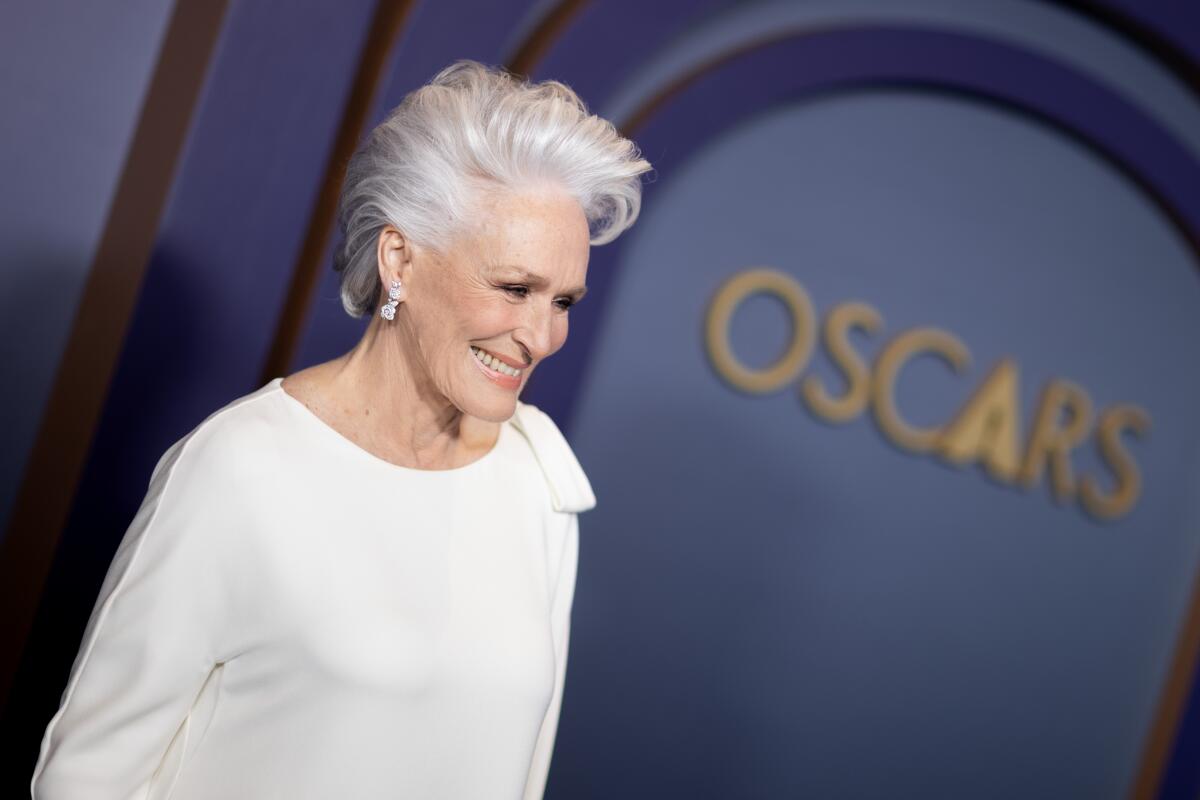
Actor Glenn Close, who presented “The Big Chill” collaborator Carol Littleton with an honorary Oscar on Tuesday, pictured on the Governors Awards red carpet.
(Jay L. Clendenin/Los Angeles Times)
Littleton earned an Oscar nomination for her editing work on Steven Spielberg’s “E.T. the Extra-Terrestrial” and collaborated with Jonathan Demme (“Beloved,” “The Manchurian Candidate”) and Lawrence Kasdan (“Body Heat,” “The Big Chill”) on multiple films. She served as governor of the academy’s film editors branch and was married to former academy president and accomplished cinematographer John Bailey, who died in November. They worked on 12 films together.
“I accept this beautiful Oscar as a highlight of my life in the film,” Littleton said. “I accept it for all editors who toil in the darkness of an editing room … to create a unique, believable world born to the imagination. And most of all, I want to thank John, my dear John.”
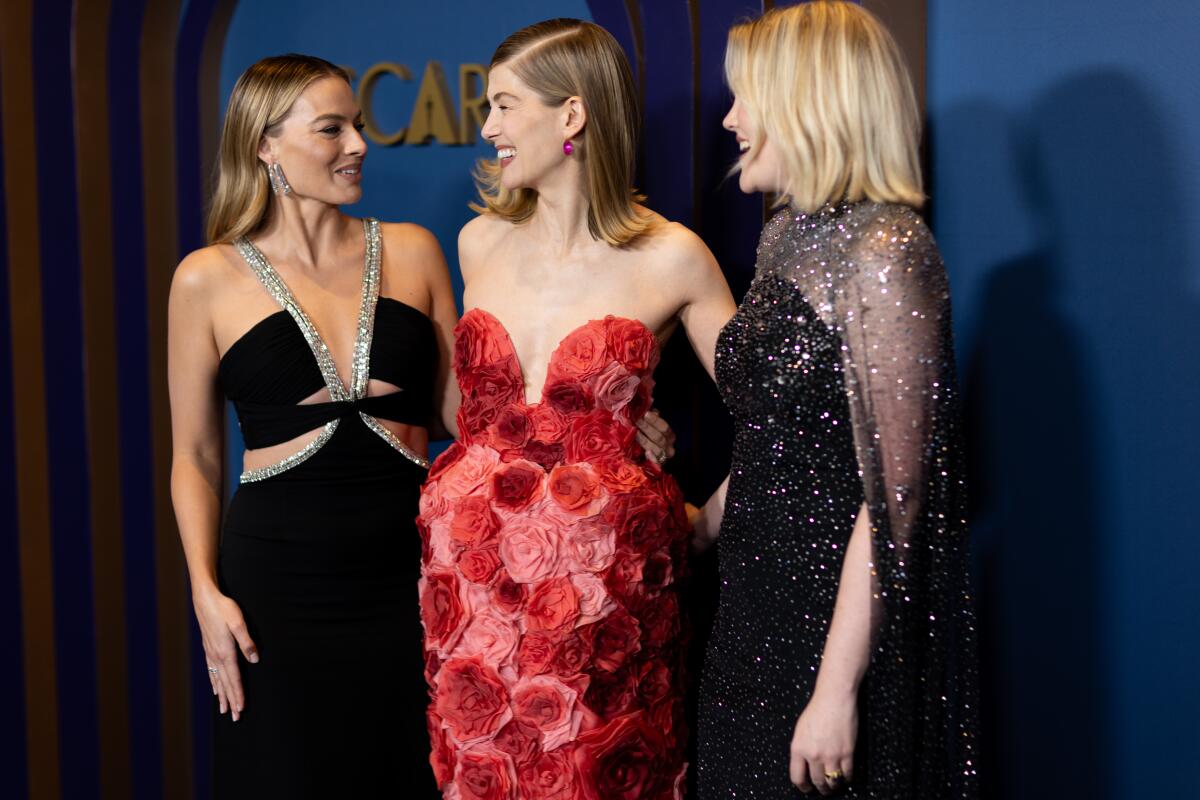
Margot Robbie, Rosamund Pike and director Emerald Fennell, from left, on the red carpet at the Academy of Motion Picture Arts and Sciences and the Board of Governors, Honorary Awards.
(Jay L. Clendenin / Los Angeles Times)
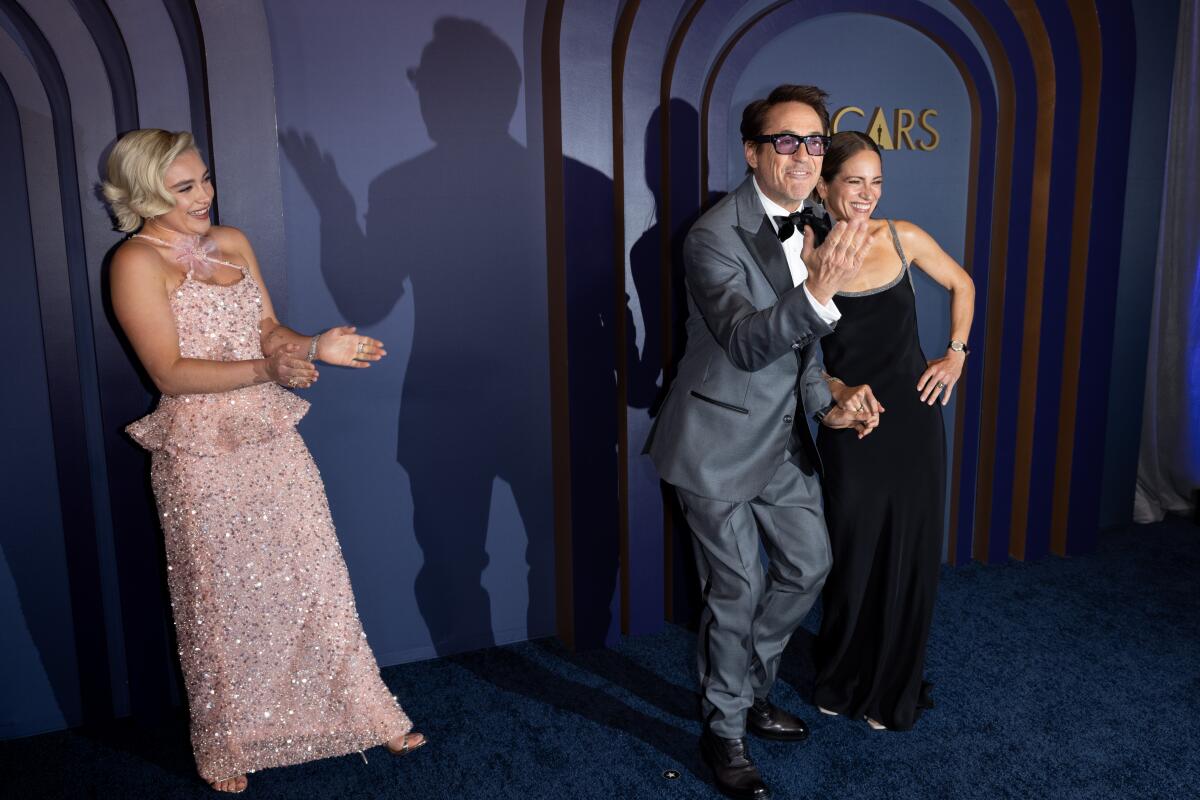
Florence Pugh, Robert Downey, Jr., and Susan Downey, on the red carpet.
(Jay L. Clendenin/Los Angeles Times)
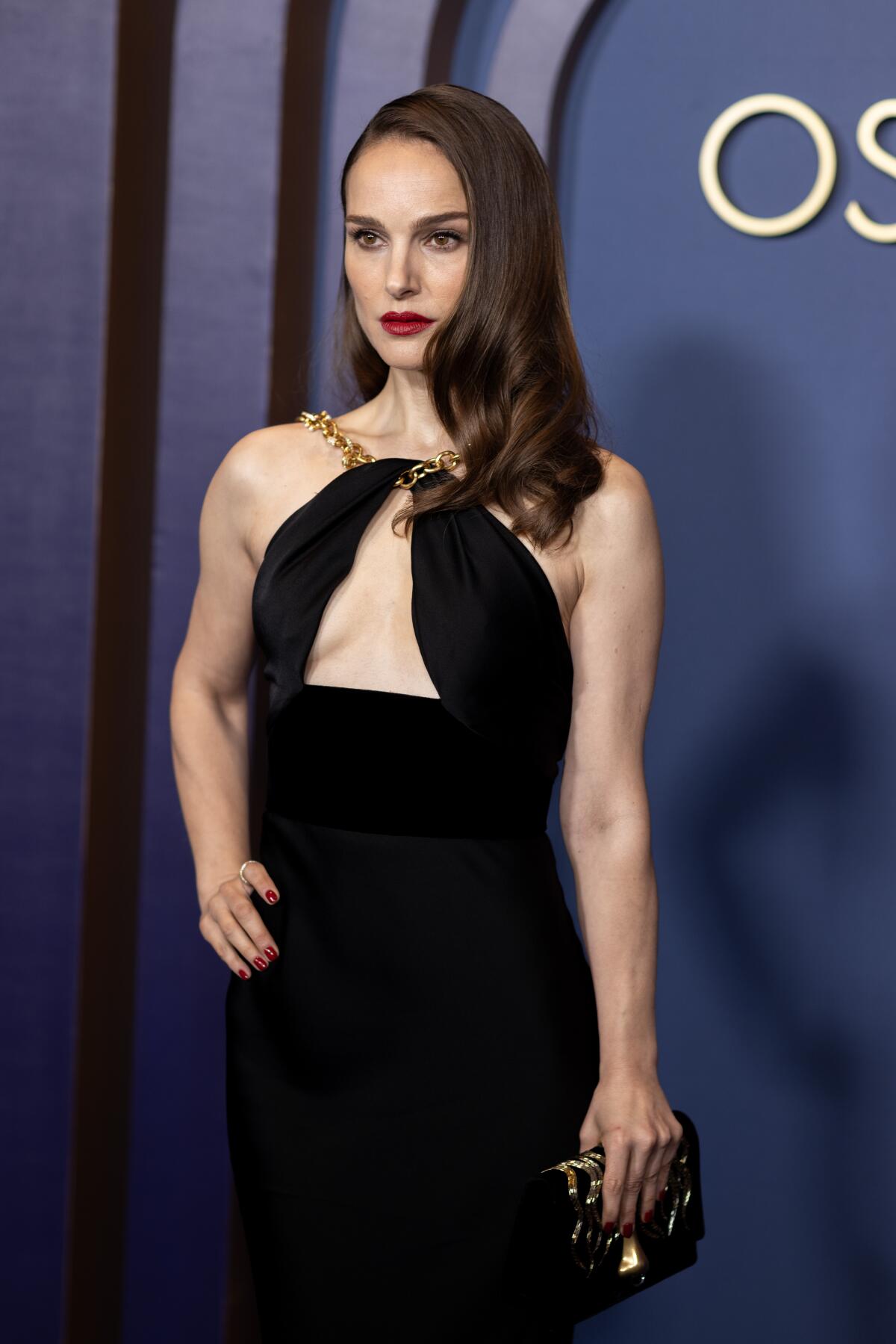
Natalie Portman, on the red carpet.
(Jay L. Clendenin/Los Angeles Times)

